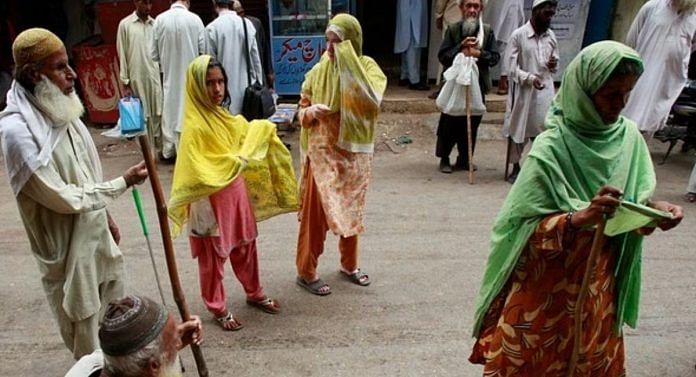New Delhi: Organised beggary is set to become a criminal offence in Pakistan – carrying a potential jail term of seven years. Amid rising instances of human trafficking and Pakistani nationals begging abroad, the Senate on Friday proposed amendments to existing legislation to curb such practices both within the country and beyond.
The upper House of the Pakistan Parliament unanimously passed three bills: the Prevention of Trafficking in Persons (Amendment) Bill, the Prevention of Smuggling of Migrants (Amendment) Bill and the Emigration (Amendment) Bill. They were moved by Federal Law Minister Azam Nazeer Tarar, who reportedly accused trafficking gangs of “smuggling” beggars abroad and “tarnishing” the country’s reputation.
While the bills will be debated again in Parliament on 17 February, legal experts are already sceptical. Some call it a ‘welcome move’, while others want the government to focus on the rehabilitation processes for such people first.
“While any measure taken to discourage beggary and the exploitation associated with it is welcome, it’s more important that the economic conditions leading to poverty that force people to beg is eliminated,” economist Javed Hassan told ThePrint.
The Ministry of Overseas Pakistanis has reported that a significant number of Pakistanis have been deported from Gulf countries for various reasons, including involvement in begging. In fact, in November last year, the government added the names of 4,300 beggars to the Exit Control List (ECL).
The proposed legal amendments come after several boat capsizing incidents came to light. Many Pakistani illegal migrants tragically drowned in these very boats while attempting to reach Europe via human traffickers. These casualties prompted Prime Minister Shehbaz Sharif to direct action against human smugglers and their accomplices, Geo News reported.
The Prevention of Trafficking in Persons (Amendment) Bill includes provisions to increase penalties for human traffickers. According to Geo News, it proposes increasing prison time for traffickers from three to seven years, and from seven to 10 years, along with a penalty of PKR 1 million. Meanwhile, crimes involving women and children could result in up to 14 years of imprisonment and a fine of up to PKR 2 million. “Organised beggary” has been added as a provision under this very bill. Adding beggary to the list of punishable offences will help prosecute the agents and gangs who smuggle beggars abroad, particularly Gulf countries.
Experts question bills
The amended trafficking law could result in severe punishments for those involved in organised beggary. A person who recruits or forces another into begging could face up to seven years in prison. This criminalisation is intended to target the mafias and traffickers who exploit vulnerable individuals – particularly children, women, and people with disabilities – for financial gain.
However, critics warn that such legislation could inadvertently punish victims of trafficking instead of the actual traffickers.
“Many involved in begging are victims of trafficking or social exclusion. Instead of offering protection, criminalising begging could subject them to police harassment and imprisonment,” advocate Shafiq Ahmad told ThePrint.
He also highlighted the lack of rehabilitation measures in Pakistan, and the absence of adequate social welfare policies: “Law enforcement in Pakistan has a history of misusing laws to extort money from marginalised communities. Without oversight, this could become another tool of exploitation.”
While these legislative changes are framed as necessary to protect Pakistan’s reputation abroad and curb the exploitation of vulnerable individuals, they have raised serious concerns about the state’s approach to poverty and social welfare.
“Would these changes not increase the vulnerability of individuals already in extreme poverty — those with disabilities, individuals with mental illnesses, or people who inject drugs — to arrest and punishment?, Geo News Journalist Benazir Shah wrote on X, further arguing that, “instead of such laws, should the state not be exploring alternative solutions to address poverty, such as providing these individuals with access to welfare programs, rehabilitation, and other support services?”
But another Pakistani journalist, Mohsin Meer, thinks differently: “Good! we have admitted ours is a nation of organized beggars.”






The headline should be, “Will Pakistan criminalise all of Pakistan?”
The people see the examples being set by their leaders and emulate them.
Pakistan’s leadership has always gone abroad with a begging bowl. Quite naturally, the masses thought that was the right thing to do. They simply followed their leaders.
It’s wrong to fault the masses on this issue.
Once Pakistan’s leaders stop begging when they are abroad, the average Pakistani would stop too.